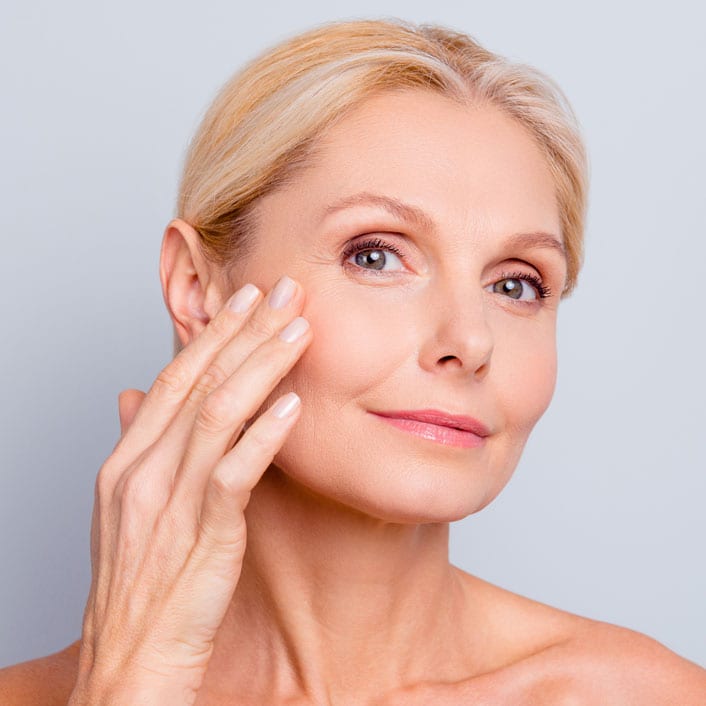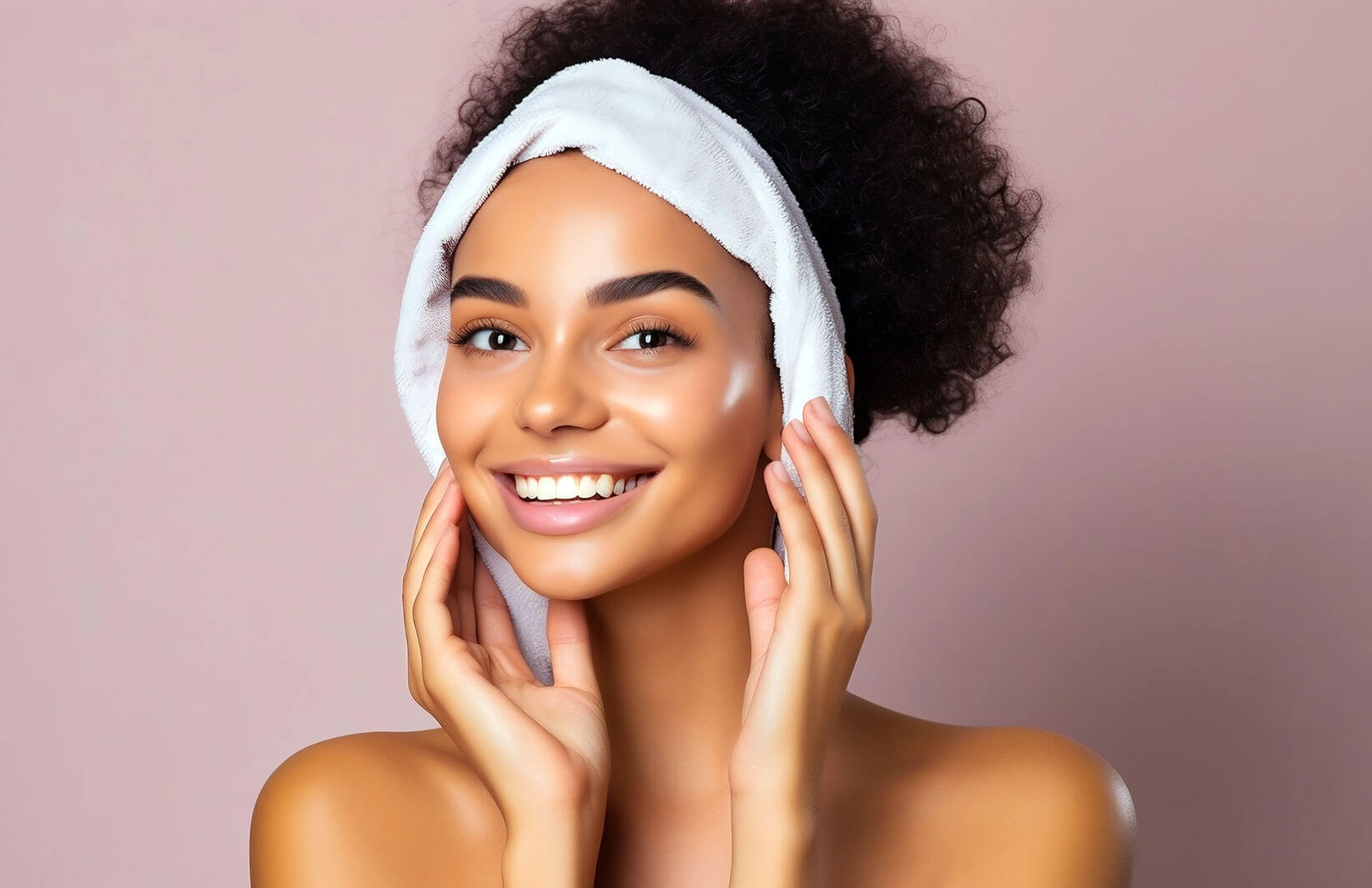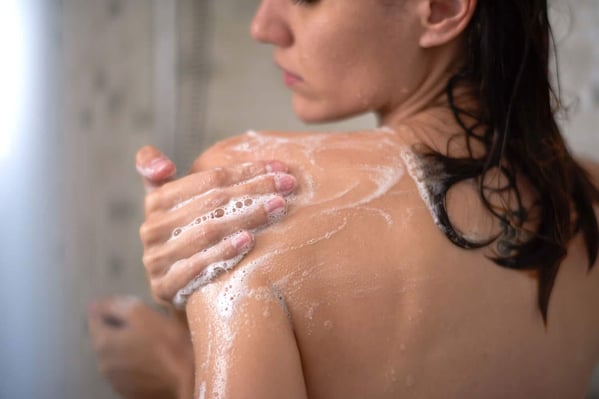Dehydrated Skin Best Moisturizers and Makeup Tips
Dehydrated skin can look a lot like dryness, but the difference is very important when it comes to treating the issue and maintaining a healthy, balanced complexion. When skin is chronically low on hydration, it can lead to complications and discomfort, including general health problems if the dehydration becomes too severe. Treating skin dehydration means adopting lifestyle choices that support healthy skin in addition to treating the symptoms at hand, to prevent the issue from returning.

- Scaly skin
- White flakes
- Redness
- Irritation
- Itchiness
- Skin dullness
- Increased fine lines and wrinkles
- Shadow areas developing in the face
Skin dehydration is often an early stage of general dehydration, which can lead to serious health issues. Darker urination, fatigue, and dry mouth are signs that first aid interventions are necessary, including purposeful fluid intake. Reversing dehydration is a matter of treating the lack of water in the skin, which can be done in a number of ways and then taking care to prevent it from happening again.
Before discussing the best ways to hydrate your skin, it helps to understand how it got that way. While some people are just prone to dehydration more readily than others, in most cases there are direct causes that are rooted in environmental issues and your response to them.

Arid environments tend to contribute to skin hydration issues, even in temperate climates. Often, this risk can be offset by using the best moisturizer for dehydrated skin you can find. Look for active ingredients like Vitamin C that help with elasticity and plumpness, as well as formulations that address both hydration and moisture, like Vital C Hydrating Water Burst from IMAGE Skincare.
Exposure to skin irritants like dust and pet dander can lead to problems with hydration if the skin reacts, and even people who are not allergic can have reactions if exposed to high levels of irritants. Chemical irritants can also affect the skin’s ability to retain water. Some, like rubbing alcohol, can even disrupt your skin’s healthy balance immediately on exposure.
Avoiding environmental factors is very important if you have regular issues with dehydrated skin, because they are probably adding to other causes that are less visible, including your skin’s regular chemistry. Removing environmental factors can help you figure out what other causes are there, especially if you work with a dermatologist to tackle the issue systematically.

When skin is both oily and dehydrated, it is primed for an easy acne breakout. Using a general moisturizer that is meant to replenish skin oils but not to hydrate skin does not help the issue, either. The key is to treat the oil buildup while also replenishing your skin’s hydration. That can be tackled as a single step or as two steps, with a dedicated product for each. If you are treating acne with an astringent that dries the skin, a double action moisturizer with hydration is an easy way to follow up.
Skin hydration issues are sometimes a sign of a more serious underlying condition, like Ehlers-Danlos Syndrome. If regular skin care does not restore your skin’s healthy balance, it’s a good idea to follow up with a medical provider so you can track down the reasons behind your recurring dehydrated skin.

The core components of a healthy skin routine are simple: Keep the skin clean without irritating it, restore its natural balance of resources, provide it with nutrients that help it bounce back from damage, and protect it from new damage. Putting those principles into practice is a little more complex. Here is a simple routine you can adopt with just a couple minutes of extra prep time in the morning and evening.
- Start with a cleanser. It’s a good idea to use one like our Perricone MD Hypoallergenic Gentle Cleanser that’s designed to avoid irritating sensitive skin, especially if you see dullness or scaliness already. Be thorough, and make sure you don’t miss any spots on your face.
- Use a combination hydration and moisturizer product like the Vital C formula from IMAGE Skincare. Moisturizer with an additional hydration in the formula is the best moisturizer for dehydrated skin, so look for the additional active ingredients for hydration if you opt for a different formulation. Another option is to use a high quality moisturizer and a separate hydrating serum to apply more concentrated hydrating effects.
- Add in a serum or cream with additional nutrients that promote healthy skin, like hyaluronic acid or other sources of vitamin C and vitamin A. If you are looking for a vitamin A cream for all-day effects, make sure you have a formulation that is built for it, because on its own additional vitamin A can make skin more sensitive to sunlight. That can, in turn, dehydrate the skin from overexposure to the sun and make it harder to maintain a healthy balance.
- SPF protection is a vital part of a daily skin care routine, because ultraviolet light exposure accounts for a lot of the damage to skin that results in visible aging. Clinically proven skin care can turn back the damage, but you will get better effects if you also prevent new damage with a protective daily facial sun block.
In addition to these four must-have components, you can add extras to your daily skin routine to help fight skin dehydration more actively. Adding in a toner with additional nutrient support, carrying a to-go hydrating moisturizer for touch-ups throughout the day, and adopting hydration-enriching makeup formulations are all good ideas to add to this routine if you have regular issues with dehydrated skin.
For those who see improvements with a simple skin routine but who also still have symptoms, these additional steps are often the key to getting the complexion you have been working toward. Achieving those goals is easier when you go beyond skin care by adopting other healthy habits that support your skin chemistry and overall health. The best news is, following up with these changes can improve your overall feeling of wellness and give you additional energy throughout the day.

Many people work to get in their recommended daily water intake in a lopsided way, either intentionally or not. Sometimes it is to make room for other beverages, including those with alcohol and caffeine. Both of these can pose additional challenges to healthy hydration. Consistent water intake in between other beverages helps you maintain that balance by spacing out drinks and foods with less hydration value.
Making room in your schedule to check your skin for signs it needs a little extra replenishment is a good idea, too. If you wear makeup, you can apply touch-ups to your appearance and additional hydration at once by using a moisturizing and hydrating product like IMAGE Skincare’s Conceal Flawless Foundation. Lip color and eye shadow designed to hydrate or to protect against dehydration are also available, making it possible for you to get most of your core makeup products in formulations designed to support your skin.
Regular exercise also helps your body regulate its water intake and output and helps with your metabolism, which affects how quickly food and drink works to replenish the important nutrients your cells need to stay healthy. That same mechanism also restores water to cells, replenishing dehydrated skin before symptoms become visible.
Minimizing exposure to direct sunlight is a choice for most people, and one that has a huge impact on your skin. The irritation caused by sunburn is a major source of dehydration and dryness on its own, and long-term ultraviolet damage can permanently change the skin’s ability to retain the nutrients, oils, and water it needs to look its best.
It’s important to remember that some sun exposure is healthy, since it is a major source of vitamin D, and vitamin D is an essential nutrient for humans. The key is not to stay inside and avoid the sun, but to enjoy it in a healthy amount while minimizing the chance of over-exposure. Balance additional sunblock against covering up to get your summer tan and keep your healthy glow, but be wary about being under a hot summer sun for too long, because your skin is still taking exposure to its light and UV rays even if you are shaded or the day is overcast.

Emphasizing foods rich in vitamins is important, but so is avoiding foods that could add to skin irritation. Foods high in simple carbohydrates like refined sugar can exacerbate issues like acne, which in turn affect your skin’s hydration. Enjoying them in moderation is often just as important as eating nutrient-rich foods.
Avoiding diuretic chemicals like alcohol and caffeine or drastically limiting their intake helps even out your hydration cycle too. It’s also important to remember that alcohol directly dehydrates you when trying to address any kind of dehydration issue, especially if you are in a high heat or low humidity environment. Under those conditions, it’s even more important to balance a responsible intake with water and healthy foods.

Depending on what is found, treatment could come in one of many forms.
- Prescription moisturizers, serums, or ointments
- Daily oral medication
- Periodic treatment in-office utilizing condition-specific protocols
- Prescription vitamins
In addition to these interventions, doctors often include specific recommendations for lifestyle changes based on a patient’s individual needs. If skin dehydration is a common issue for you, consider seeking medical intervention while maintaining your healthy skincare habits
Top 5 Cleansers for Dry Skin
It’s no fun dealing with dry skin. Your skin feels rough and [Read More...]
How to Revitalize Your Dehydrated Skin Care Routine
All skin types, listen up! You can get dehydrated skin, whether naturally [Read More...]
Dry Skin Savior: Luxury Skincare Products and Tips for Long-Lasting Hydration
When your skin gets flaky or feels rough and tight, things start [Read More...]
Bring Dull Skin to Life: Luxury Skincare Products for a Radiant, Glowing Complexion
Is your face feeling perpetually dry, or do you notice that makeup [Read More...]
Top Body Lotion for Dry Skin
The importance of body lotion goes overlooked. You see the product so [Read More...]
Our Top Moisturizers with SPF Protection
It pays to invest in a good quality moisturizer with SPF protection. [Read More...]
Body Exfoliating for Smooth Skin
Exfoliation must be a part of your skincare and body care routine. [Read More...]
What Deficiency Causes Dark Circles Under Eyes And What Are The Treatments
Having dark circles under eyes is not something to shrug off. Not [Read More...]
How to Get the Best Sunburn Relief and Protection
By Laura Bissessar Ouch, getting a sunburn is no one’s idea of [Read More...]
Best Body Wash for Women and Why You Need Them
Incorporating the best body wash for women into your shower routine can [Read More...]











